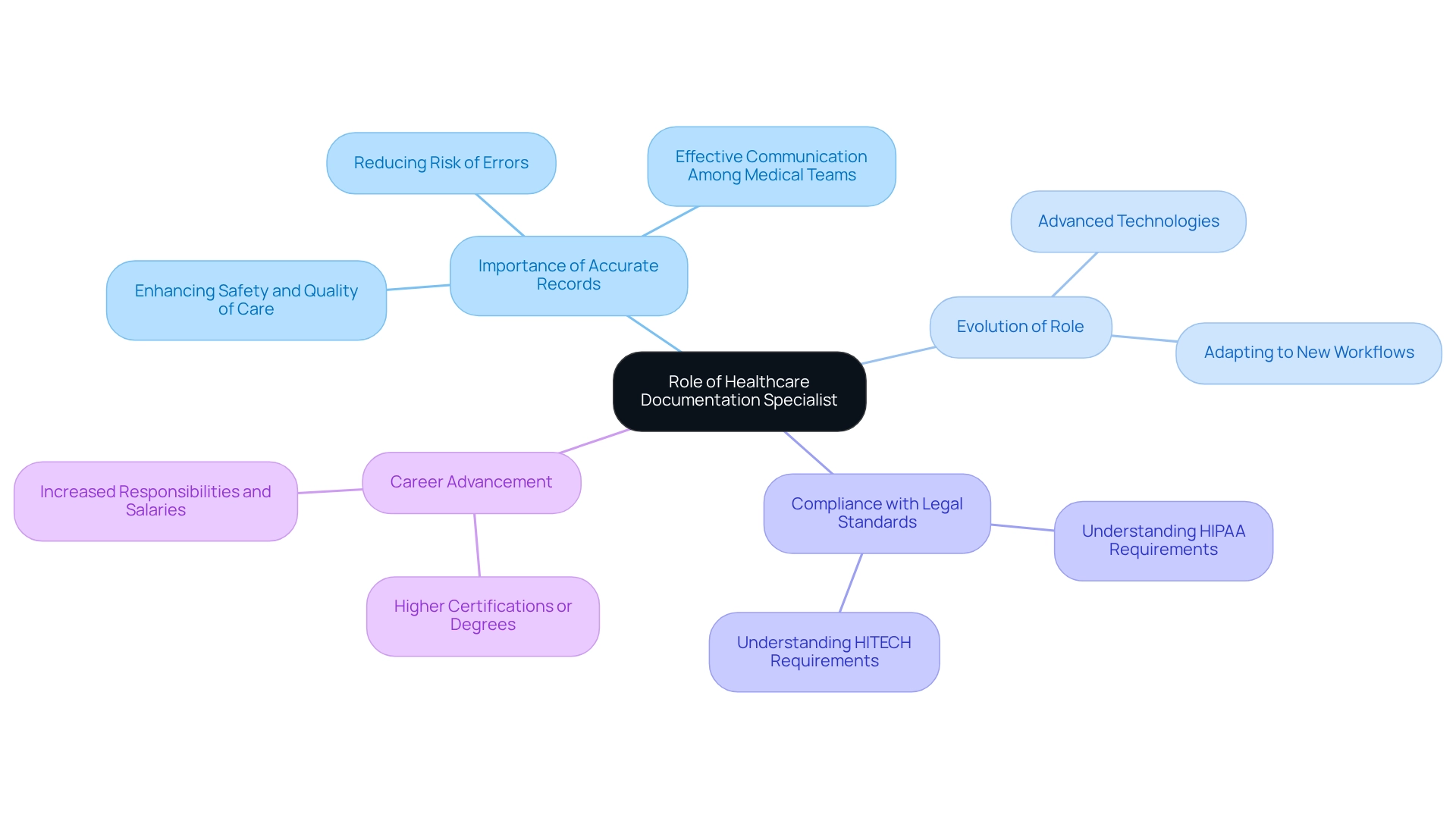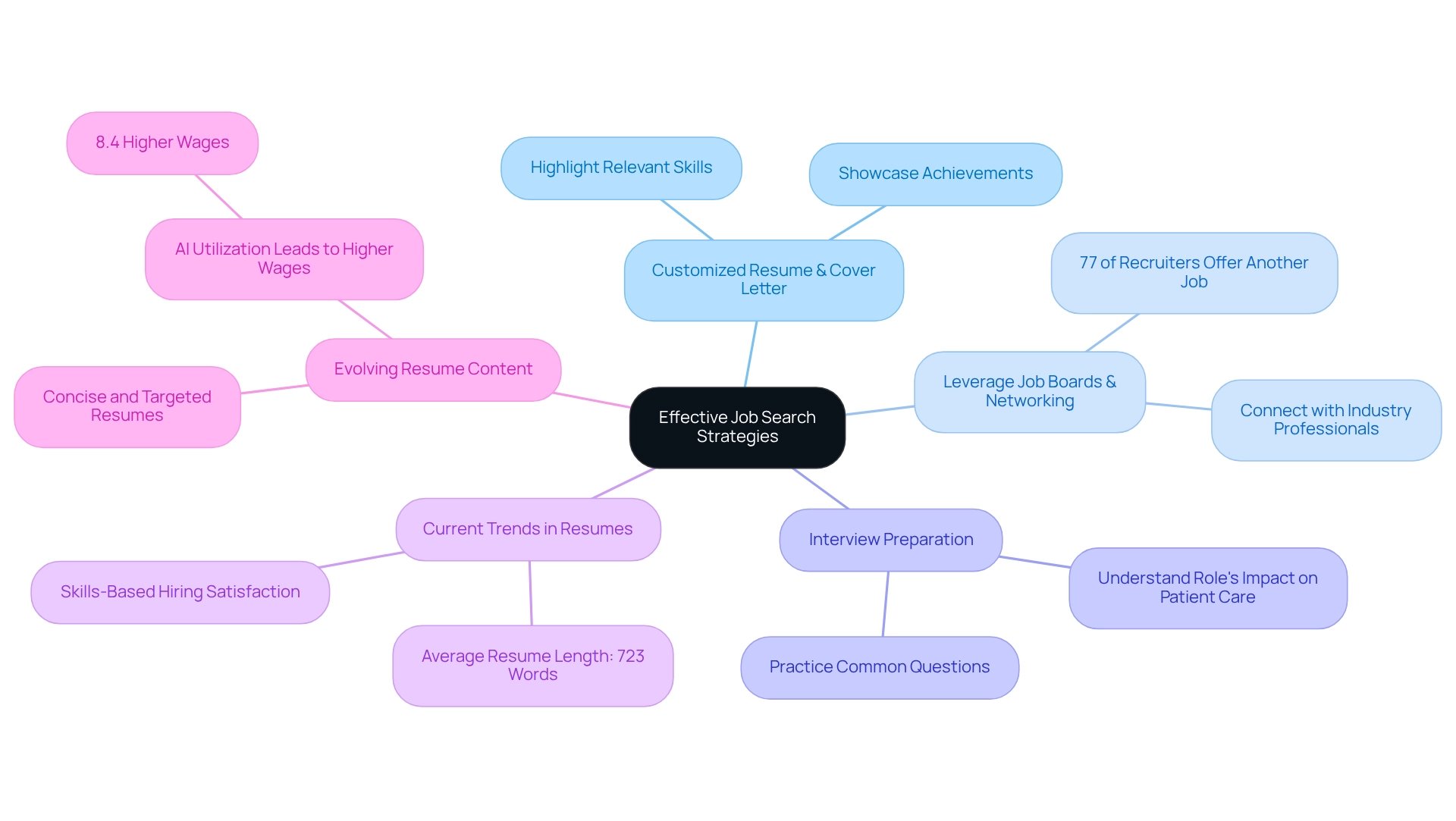Overview
Securing a job as a healthcare documentation specialist can feel overwhelming at times. Many candidates face emotional challenges, such as uncertainty about meeting the role's requirements and navigating the competitive job market. It's important to understand that you are not alone in this journey.
To enhance your prospects, focus on meeting the educational and certification criteria, such as obtaining the CHDS certification. Cultivating necessary skills and implementing effective job search strategies can significantly ease the process. Remember, strong attention to detail is not just a requirement; it’s a vital asset that can set you apart in this field.
Imagine how much more confident you will feel when your job applications are tailored to highlight your unique qualifications. By combining relevant education, certifications, and a meticulous approach to your applications, you can truly enhance your chances of success.
Take a moment to reflect: What steps can you take today to move closer to your goal? Embrace the journey, and know that every effort counts. You have the potential to make a meaningful impact in the healthcare sector, and with the right preparation, your dream job is within reach.
Introduction
In the intricate world of healthcare, the role of a healthcare documentation specialist is often overlooked, yet it is crucial for ensuring patient safety and the quality of care. Have you ever considered the unsung heroes behind the scenes? These dedicated professionals are responsible for transcribing medical records and maintaining compliance with stringent regulations, all while addressing the emotional burdens that healthcare providers face.
As the healthcare landscape evolves, so too do the responsibilities of these specialists. They now incorporate advanced technologies and a deeper understanding of legal standards, enhancing their ability to support patient care. This article delves into the essential skills, educational requirements, and strategic job search tactics necessary for aspiring healthcare documentation specialists. By understanding their role, you can see how they make significant contributions to the healthcare system while advancing their own careers.
Imagine the impact of having well-organized, accurate documentation on patient outcomes. It not only alleviates administrative burdens but also allows healthcare providers to focus more on what truly matters—patient care. Let us explore how you can enhance your career in this vital field and contribute to a healthier future for all.
Understand the Role of a Healthcare Documentation Specialist
Medical record specialists play a vital role in our healthcare system, deeply committed to transcribing health records, ensuring compliance with regulations, and safeguarding the confidentiality of individuals. Their dedication is crucial to the medical records process, directly influencing care by ensuring that accurate and timely information is available to medical providers.
Accurate records are essential for enhancing safety and quality of care. They form the foundation for effective communication among medical teams, significantly reducing the risk of errors and improving clinical decision-making. For instance, case studies reveal that hospitals with robust record-keeping practices experience fewer adverse events, underscoring the importance of these professionals in safeguarding patient outcomes.
As we look to 2025, the responsibilities of medical record professionals have evolved, expanding beyond traditional tasks to include advanced technologies that streamline record-keeping processes. This transformation reflects the growing complexity of healthcare delivery and the necessity for specialists to adapt to new tools and workflows. It is imperative for these specialists to understand HIPAA and HITECH requirements, ensuring that all record-keeping practices comply with legal standards while maintaining the highest levels of patient confidentiality.
Moreover, professional insights highlight that efficient record-keeping is paramount for delivering quality medical care. One specialist poignantly noted, "Effective record-keeping is crucial for providing quality medical care, but executing a plan to ensure that optimal practices are adhered to is not a simple endeavor." This statement reinforces the essential role that record-keeping methods play in the healthcare system. Additionally, opportunities for career advancement in healthcare documentation specialist jobs suggest that professionals can enhance their responsibilities and salaries by pursuing higher certifications or degrees, further illustrating the evolving nature of their roles.
Compensation for health record professionals should reflect their skills, knowledge, and experience, recognizing the significant contributions they make to patient care and safety. As continues to evolve, the role of record-keeping professionals remains critical in supporting patient care and enhancing overall medical quality.

Meet Educational and Certification Requirements
To obtain healthcare documentation specialist jobs, it is vital to fulfill certain educational requirements. Typically, an associate degree or higher is necessary for healthcare documentation specialist jobs, focusing on subjects like medical records, medical terminology, anatomy, and health information management. Accredited programs provide comprehensive training in these areas, ensuring that candidates are well-prepared for the demands of the role.
Have you considered how obtaining certifications, such as the Certified Healthcare Documentation Specialist (CHDS), can significantly enhance your qualifications and career prospects? Certification not only demonstrates a commitment to the profession but often leads to better opportunities and advancement in healthcare documentation specialist jobs. It’s essential to investigate certified programs that provide training for credentials, as these programs are designed to equip you with the skills and understanding needed to thrive in medical recordkeeping.
As we look ahead to 2025, the environment for healthcare documentation specialist jobs continues to evolve, with a growing focus on certification as a crucial element in career progression. Specialists emphasize that certified individuals are frequently favored by employers for healthcare documentation specialist jobs, which highlights the increasing acknowledgment of the importance of formal training and qualifications in ensuring high-quality record-keeping practices.
Consider the case study 'Setting a Benchmark in Faith-Focused Medical Care,' which illustrates how CosmaNeura has established itself as a leader in . This underscores the necessity for specialized training in medical record-keeping within this sector. By investing in your education and certification, you position yourself for success in healthcare documentation specialist jobs within this vital field of medicine.
Furthermore, adhering to ethical standards in healthcare records is paramount. As stated by AHIMA, "If you believe an AHIMA member or credentialed professional has violated the Code of Ethics, you may file a complaint with AHIMA." This reinforces the importance of maintaining ethical practices in the field.
Moreover, precise records play an essential role in individual care. Did you know that statistics suggest false alarms in intensive care units are often linked to errors in records? This highlights the significance of accurate record-keeping. By ensuring high-quality record-keeping methods, medical record specialists can contribute to improved patient outcomes.
By focusing on recognized programs and acquiring relevant certifications, you can enhance your qualifications and career opportunities in medical record management. Your journey towards securing healthcare documentation specialist jobs is not just about meeting requirements; it’s about making a meaningful impact in healthcare.
Cultivate Essential Skills and Competencies
- Enhance your attention to detail by consistently practicing record-keeping tasks and thoroughly reviewing medical files for precision. This skill is not just important; it is essential for meeting highlighted in 5,026 healthcare documentation specialist jobs. By ensuring that records are accurate, you contribute to the ethical standards expected in our industry.
- Develop strong communication abilities to work effectively with healthcare providers, ensuring a clear understanding of their record-keeping needs. Effective communication fosters teamwork and significantly improves patient care outcomes. Have you considered how actively listening to providers and asking clarifying questions can enhance the record-keeping process?
- Familiarize yourself with medical coding systems like ICD-10 and CPT to boost your record accuracy and efficiency. Understanding these systems is crucial, especially as AI continues to transform medical coding and revenue cycle management (RCM) services. This transformation greatly impacts financial performance and operational effectiveness in healthcare organizations. As Chirag Bindal noted, the influence of AI in these areas is profound, highlighting the importance for records professionals to stay informed.
- Remain aware of the limitations of current coding solutions, such as Computer-Assisted Coding (CAC), which encounter challenges in scalability and adaptability. Understanding these constraints can guide the development of essential skills, particularly in attention to detail and flexibility in record-keeping practices. Continuous improvement and innovation in medical coding technologies are vital for ensuring accurate and efficient coding practices. Seek expert guidance on the essential skills for healthcare documentation specialist jobs, emphasizing the importance of attention to detail and communication abilities. These skills are crucial for success in the evolving landscape of medical records.
Implement Effective Job Search Strategies
- Create a customized resume and cover letter that not only highlight your pertinent skills and experiences in medical documentation but also reflect your unique journey. By showcasing specific achievements and competencies that align with the job requirements, you can significantly increase your chances of catching a recruiter's attention.
- Leverage job boards and professional networks to discover job openings and connect with industry professionals who understand your challenges. Engaging with platforms focused on medical roles can provide access to exclusive opportunities and valuable insights into the hiring landscape. Remember, 77% of recruiters have offered another job to a candidate they initially rejected. This underscores the importance of persistence and the power of networking in your job search.
- Prepare for interviews by practicing common questions and demonstrating your understanding of the role's impact on patient care. Familiarize yourself with the subtleties of medical records, as showcasing this knowledge can set you apart from other applicants.
- Stay updated on current trends in resume effectiveness. Statistics indicate that resumes for senior-level candidates averaged 723 words in 2024, suggesting that while detail is important, clarity and conciseness are equally crucial in making a strong impression. Employers using skills-based hiring methods report higher satisfaction with their hires, reinforcing the need to emphasize relevant skills in your application materials.
- Consider the evolving nature of resume content. Case studies reveal that while extensive experience can be are often more effective in capturing recruiters' attention. Tailoring your resume to reflect the specific skills and experiences relevant to healthcare documentation specialist jobs can enhance your visibility in a competitive job market. Additionally, applicants who utilize AI in their resumes have been offered 8.4% higher wages than those who do not, highlighting the value of modern resume strategies.

Conclusion
The role of healthcare documentation specialists is undeniably vital in our healthcare system. They serve as the backbone for accurate patient records and compliance with regulations. Their expertise not only enhances patient safety and care quality but also fosters effective communication among healthcare teams, ultimately leading to better clinical outcomes. As their responsibilities evolve with technology and regulatory changes, it becomes increasingly important for aspiring professionals to equip themselves with the necessary educational qualifications and certifications.
Meeting educational requirements and obtaining relevant certifications, such as the Certified Healthcare Documentation Specialist (CHDS), can significantly bolster career prospects. These credentials validate a professional's commitment to the field and open doors to advanced opportunities and increased compensation. Moreover, cultivating essential skills like attention to detail, effective communication, and familiarity with medical coding systems is crucial for success in this dynamic role.
Implementing strategic job search tactics can further enhance career advancement. By tailoring application materials and leveraging professional networks, candidates can better position themselves in a competitive job market. Staying informed about current trends and the evolving nature of healthcare documentation will ensure that specialists remain valuable assets in their organizations.
Ultimately, the contributions of healthcare documentation specialists are fundamental to the overall success of patient care. By recognizing their importance and investing in education, skills development, and strategic job searching, aspiring professionals can not only advance their careers but also play a crucial role in fostering a healthier future for all.




